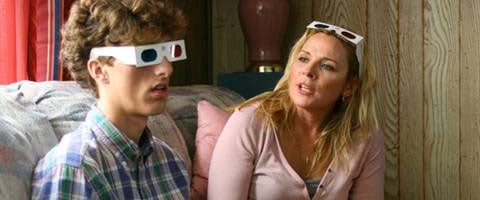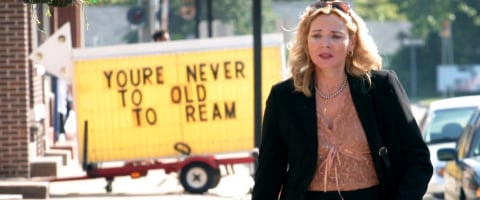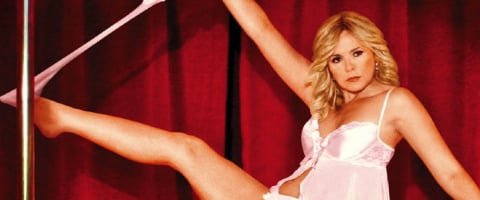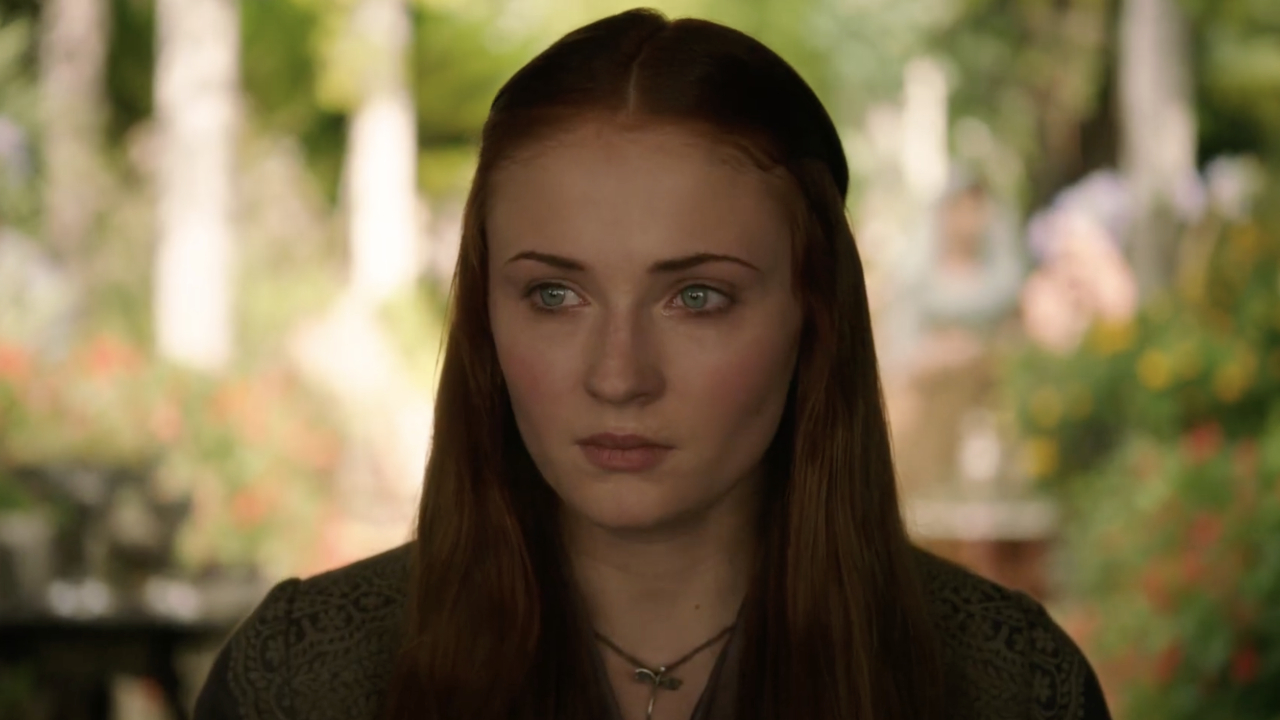Interview: Meet Monica Velour's Kim Cattrall

After starring as Samantha Jones in Sex and the City for so many years, it’s easy to forget Kim Cattrall can play anything but strong, ambitious and beautiful. Well, her latest film, Meet Monica Velour, is certainly a good reminder that this actress has range and is willing to go to some pretty extreme lengths to do her roles justice.
Kim Cattrall is Monica Velour, a washed up porn star who can’t get decent work, is constantly berated by men and risks losing her child in a custody battle. Having hit rock bottom, Monica is absolutely hopeless. It isn’t until geeky teen and diehard fan, Tobe (Dustin Ingram), steps into her life that she realizes there is some good in this world and, with his help, she could possible pull through.
After a great deal of rehearsal time, filming, the post production process and then a festival run, Cattrall, Bearden and Ingram are finally about to see their movie hit theaters. In honor of Meet Monica Velour’s April 8th release, Bearden and Ingram flew back to New York City to celebrate their achievement, promote the film and to get a home cooked meal à la Cattrall. Read all about that and more in this roundtable interview.

What’d you cook for them?
Kim Cattrall: Well, it's very difficult because Dusty has suddenly become a vegan, I don't know what, so I had to run out and just get a bunch of vegetables and just grill them and a little pasta. It's not my usual fare. They went to see Sleep No More and then they came over for dinner. They left at like one. I said, 'You've got to leave.' They’re like, [mimics them chattering]. They're so excited. I mean not that I'm not excited, but they’re like - this is his first movie. It's an amazing moment.
Does it remind you of the early days in your career when you were doing these kind of movies?
It does, but I never wrote a film and directed it and all that [Keith’s] done. This was such a labor of love and he's so good at what he does. He's so smart and funny and lovable.
Your Daily Blend of Entertainment News
You had made movies in the '80s, so did this remind you a little bit of the hair dos of those days?
Yeah. It's real case of arrested hairstyle, you know? We had so much fun hair and makeup wise and also gaining the weight was just the best possible thing and not exercising for two months was amazing. All those kind of treats and that's what I love about being an actor; you can transform yourself in that way. It’s easy to diet or get off a diet when you've got a juicy role to play.
I met Keith, they sent me the script and he was seeing quite a few actresses. I met with him in a little Thai place on 52nd and 7th and we hit it off pretty much from the first two or three minutes of talking and basically just about film. We talked about the character a little bit, but mostly about films from the '70s because he's a huge film buff and he's really smart.
I think my biggest contribution to what he has on paper is I said to him, “I think what we really need and what's missing a little bit is the connection to the daughter because I feel that this is really a story about a woman fighting for the right to have her daughter with her, the custody battle, and everything stems from that.” He said, “You're right,” and we changed a few things, which I think really helped with the conflict and with Monica.

Why is it important for you to play characters that show older women having a right to sexuality and not just teenagers?
[Laughs] Because I am an older woman who has a right to my sexuality at any age; it's my choice. I feel sometimes and in some ways like Linda Romanoli and Monica Velour; I feel marginalized because I'm in my fifties. If you went online and you look at some of the blogs, which one can do on a lonely night, it's pretty startling what people will say about you just because you're in your fifties. And I'm on the early side of fifty and I've had a whole life of Jane Fonda tapes and dieting and exercise and all the rest of it. I just think, how is it going to get any better if this is where it is now? Thirty was one thing, thirty-five. In Sex and the City and shows like Sex and the City we've been able to push the barrier back, but fifty, it comes with disgust and anger and marginalization, which is really pathetically sad. It’s rampant in North America. It's in Europe, yes, a little bit, but nowhere near - I think that's why I've been working a lot over there because they celebrate it. Here they don't know what to do with it; it's scary, it's threatening.
Did you do any research into meeting women like that? Your portrayal is so multidimensional?
Thank you. I didn't meet any porn stars. What I did do is watch a lot of 70s porn and I watched a lot of documentaries about pornography. What was so frightening about it is that these young girls, I think they come from all over the world to come to Hollywood and they want to be stars, and then suddenly they realize that they don't know how to act, they're pretty but there's a lot prettier women, so then they're sort of relegated to answering ads in the back of newspapers where they're looking for live models and then nude live models and then pornography is just right there. They become stars for a period of time and then they marry. Some porn stars, even after a certain age, they'll charge a certain amount for somebody to spend the night with them as an escort. And that's the way their life evolves until there's nothing left.
Beyond that type of research and just the physical transformation, what other kind of preparation do you like to do? Maybe in terms of script breakdown and developing a back-story for your character; do things like that help you?
Oh, yeah. When we got together and we were in those rehearsal rooms I asked him so many questions. And he had a lot of great answers and some of them he said, “I don't know. Let me find out,” or, “Let's find out together,” or, “What do you think?” My major contribution I felt, as a woman, was that need to protect and to have my daughter with me. He had written it and understood it, but that was a real heartbeat for me; understanding that she would do anything that she needed to do to get her daughter back. That was the major conflict.
How did that collaborative nature carry over onto the set? Was the script fluid where you could talk about things like that before you were about to shoot something?
No, we had worked so much beforehand and we had such a great communication. There was nothing unsaid. There was nothing unexpected. Within doing the scenes, there’s stuff that I do that's not written. The whole stuff with the bikers, those are real bikers and to make out with a real biker is something that you only need to do once in a lifetime. Those guys were so sweet and they were so lovely but, you know, it's a different kind of guy. [Laughs] He just let those things happen, so there was a real trust and communication. And Dusty was complexly free. He would go with wherever you were going in the scene. He doesn't have a lot of experience, but that's just his talent as an actor.
I imagine all that preparation helped when you had such a short shoot, too.
It was crazy. My stuff was six weeks and that was a lot. There was quite a few scenes that they didn't need. He overwrote it, so we had to shoot those as well. The end was originally a very long conversation with both of us on the phone, which you didn't really need.
You and Dustin have amazing chemistry. Did you have some time to get to know each other?
No, we didn't. Keith didn't want us to spend any time together. When we first started rehearsals, which were very light, [Keith] said to me, “I don't want you to be so nice to him.” I said, “He's so adorable,” and he said, “No, I don't want you to get too close,” which I think was really a great idea because there was always a feeling of him trying to impress her. Because Dusty's a very young actor, I think that might have led to some kind of relaxed relationship, which is not onscreen. There's always a separation between the two of them.
Are you going to move into producing and developing more projects? You seem to have had so much fun doing this kind of film.
I totally do, I'm an actor, though. If I'm producing, I'm not acting and it's such a long road to get anything off the ground. I'm working with a writer now in England about a project between a mother and a daughter, which I'm really excited about, but I don't want to produce it, I don't want to direct it, I would like to act in it. That's what I do, that's what I love to do. I don’t want to be in boardrooms talking about hiring hairdressers and minivans. I'm not good at it and I don't like to hire and fire people. I hate that. It's horrible.
Underneath it all, Monica is a very strong, independent woman raising a child on her own. Are these features something you look for when considering the script? It’s interesting how it’s the complete opposite of your character in Sex and the City.
There's something about Monica that scared me because she is so hopeless. She's strong, but she has no tools to change her situation. I don't have children and to really personalize that and fight for your own - in the scene where he brings her and she could lose her court case because he's taking her outside of the parameters of what the custody arrangement is, you see her like a mother tiger. That's something that's very exciting to play and to get behind, but she doesn’t live any lifestyle of convenience. Everything is a hardship. There's no bright lights, big city. There's no posh job. There's no great fashion statement to hide behind. Those characters on Sex and the City, people blow them up, but there were some really crucial moments, especially within the series, where these women felt pretty helpless and lost, too. Was it dealing with it on a level that Monica is? No, but it was still dealing with a lot of challenges that you have as a woman who is in the world. Put on top of that aging and feeling in that hopeless state. it's heartbreaking.

When I was a young actress, Jack Lemon said to me, “Do stuff that scares you.” That's how he chose his projects and I thought, “That's a great way to look at it,” because then you're constantly changing; you're getting stronger. Not every experiment works, but I don't do roles to say, “Oh, well, wow that was great.” I do it because I can't not do it. It's so exciting. When Keith said to me, “Are you really interested in this?” I was like, “Yes, but I'm scared.” [Laughs] He said, 'I'm scared, too.” We were all scared because when you step outside of what is considered your comfort zone - it's also, you know, I'm a woman. I want to look good, I want to feel good and then I look at the stills or I look at some of the scenes in the movie and it's right in your face.
Is there a certain regimen you had to abide by in so far as -
I had to eat and not exercise. [Laughs]
What did you get to eat?
Everything. Milkshakes, bread, pasta. Everything I could possibly want. Creamy sauces, French food. Just on and on and on. And drink what I wanted to drink. I could eat fast food or I could eat a really great steak, Béarnaise with potatoes on the side. I didn't have to go to the gym and I didn't have any of the guilt because it was for my work. [Laughs]
You seem to really be enjoying the thought of this.
Oh, it was amazing and then it was over and then on the horizon I had the Polanski film and I was like, “Oh, God. Okay, start again. Get on the treadmill. Get on the diet.”
Staff Writer for CinemaBlend.

